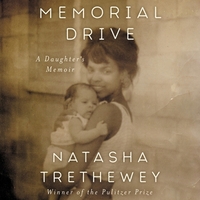You need to sign in or sign up before continuing.
Take a photo of a barcode or cover
Memorial Drive is a small, hard diamond of a memoir about a poet who is finally letting herself reflect on her mother’s 1985 murder. Former US poet laureate Natasha Trethewey has her memories, police reports, phone records, and her mother’s journal to piece together what happened and how she can keep that knowledge as part of her psyche, not a frayed or lost part of her.
There is no “why” to ask when it comes to motivation for the murder. Trethewey’s abusive stepfather threatened his wife, Gwen Gwinnette, resulting in a brief imprisonment that only sharpened his sense of entitlement. As Gwen, who had a Masters in social work, became more articulate in her desire to move on, Joel plied her w specific, material threats and emotional blackmail.
Joel’s part of the story is chilling but this memoir is only the story of Joel in that Trethewey documents his controlling behavior toward her and her mother. It’s not a true crime type of narrative, even with the written and recorded evidence Trethewey includes.
As she nears 50–10 years older than her mother would ever be—Trethewey wants to put together the pieces she remembers (and much is lost to time) with new information she receives. She begins with the murder and moves back to a content time as she grew up in her mother’s Mississippi hometown. Family members lived near one another and Trethewey—whose mother was Black and her father white—shared many of the same experiences her mother had with an additional layer of color consciousness. Although Eric Trethewey is often gone—military, graduate work—he seems loving and involved, if overly optimistic about life for a mixed race daughter in the 1960s.
This isn’t an autobiography and a lot is left off the page. Trethewey’s parents seem to drift apart from the strain of their diff perspectives. Gwen moves to Atlanta w her daughter for work. Natasha attends a mainly Black elementary where Black historical figures and writers are valued. At some point, Gwen meets and marries Joel, events that are hazy. After a summer in Mississippi, Trethewey is surprised when her mother announces that she has a baby brother, a child Trethewey assumes is Joel’s from a previous relationship.
The biographical details are often less vivid or clear than the images, metaphors, and refs to mythology that connect Trethewey to her mother. Her mission is to weave together these strands, not lock down a defense.
Given the subject matter, this is a difficult read. It’s also surprising, profound, and beautiful. The motifs that Trethewey keeps trying to put into place do coalesce by the end.
Should def reread this one.
There is no “why” to ask when it comes to motivation for the murder. Trethewey’s abusive stepfather threatened his wife, Gwen Gwinnette, resulting in a brief imprisonment that only sharpened his sense of entitlement. As Gwen, who had a Masters in social work, became more articulate in her desire to move on, Joel plied her w specific, material threats and emotional blackmail.
Joel’s part of the story is chilling but this memoir is only the story of Joel in that Trethewey documents his controlling behavior toward her and her mother. It’s not a true crime type of narrative, even with the written and recorded evidence Trethewey includes.
As she nears 50–10 years older than her mother would ever be—Trethewey wants to put together the pieces she remembers (and much is lost to time) with new information she receives. She begins with the murder and moves back to a content time as she grew up in her mother’s Mississippi hometown. Family members lived near one another and Trethewey—whose mother was Black and her father white—shared many of the same experiences her mother had with an additional layer of color consciousness. Although Eric Trethewey is often gone—military, graduate work—he seems loving and involved, if overly optimistic about life for a mixed race daughter in the 1960s.
This isn’t an autobiography and a lot is left off the page. Trethewey’s parents seem to drift apart from the strain of their diff perspectives. Gwen moves to Atlanta w her daughter for work. Natasha attends a mainly Black elementary where Black historical figures and writers are valued. At some point, Gwen meets and marries Joel, events that are hazy. After a summer in Mississippi, Trethewey is surprised when her mother announces that she has a baby brother, a child Trethewey assumes is Joel’s from a previous relationship.
The biographical details are often less vivid or clear than the images, metaphors, and refs to mythology that connect Trethewey to her mother. Her mission is to weave together these strands, not lock down a defense.
Given the subject matter, this is a difficult read. It’s also surprising, profound, and beautiful. The motifs that Trethewey keeps trying to put into place do coalesce by the end.
Should def reread this one.
dark
emotional
reflective
sad
medium-paced
emotional
medium-paced
This book is devastatingly sad, mainly because better protection for domestic abuse victims, better understanding of victims moments of peak vulnerability for violence and death, better gun laws, better education of abusers (while in prison, in this case), might have prevented the death of Tretheway's lovely hopeful mother. The opening of the book meanders a bit, but the narrative grows stronger as Tretheway approaches the central issue of the book -- an abusive stepfather. In the end, her decision to include verbatim transcripts from a taped phone conversation between Tretheway's mother and the man who soon will murder her is a wise choice: she gives her mother voice, and shows the insane circular logic of the abuser that seeks to trap the victim. Tretheway's voice in the book, and her mother's in those transcripts are soft, gentle even, which reveals a tender vulnerability but yet has a tensile power in its understatement.
This short memoir was gut wrenching. I felt so much for the author and the fear she lived in. She was delicate with her delivery of her upbringing and the trauma she experienced. I enjoyed her reflection as well.
challenging
dark
emotional
inspiring
reflective
sad
medium-paced
"Ma'am. Your mother has been shot."
Hearing those words from the police department should be enough to shake anyone to their core. From the perspective of Natasha Trethewey, it had to be even more devastating knowing the history of her family and what her step-father would ultimately do.
I struggle rating memoirs. Who am I to stay whether someone's story is good or bad, worth reading or not? This is not any memoir. It is one of profound sadness, reflection, and the path to recovery from trauma. Tretheway lays the groundwork for their family history in this novel and brings it around to when her step-father murdered her mother. She does so with beautiful language, evidence of her talent as a writer. I imagine this is therapeutic and challenging, navigating your own story that was so tragic.
We start and end this book knowing everything Trethewey knows now. What hit me was the point in the story where she describes being able to finally sit down and read through the entire police file on her mother. We knew the story and outcome, but she did not as she lived it, only to find out new information after the incident had taken place. I tried to imagine myself sitting at my table, folders and papers spread everywhere, reading about my own history for the first time. And I can't place myself in her shoes. It is too difficult. This book is our glimpse into the trauma of another person and how they faced it and worked to overcome it.
Hearing those words from the police department should be enough to shake anyone to their core. From the perspective of Natasha Trethewey, it had to be even more devastating knowing the history of her family and what her step-father would ultimately do.
I struggle rating memoirs. Who am I to stay whether someone's story is good or bad, worth reading or not? This is not any memoir. It is one of profound sadness, reflection, and the path to recovery from trauma. Tretheway lays the groundwork for their family history in this novel and brings it around to when her step-father murdered her mother. She does so with beautiful language, evidence of her talent as a writer. I imagine this is therapeutic and challenging, navigating your own story that was so tragic.
We start and end this book knowing everything Trethewey knows now. What hit me was the point in the story where she describes being able to finally sit down and read through the entire police file on her mother. We knew the story and outcome, but she did not as she lived it, only to find out new information after the incident had taken place. I tried to imagine myself sitting at my table, folders and papers spread everywhere, reading about my own history for the first time. And I can't place myself in her shoes. It is too difficult. This book is our glimpse into the trauma of another person and how they faced it and worked to overcome it.
emotional
reflective
sad
medium-paced
Beautiful memoir that brought me to tears, but I had to skip some pretty big chunks of telephone transcripts between the author’s mother and her husband/murderer, because it was just too distressing.
challenging
dark
emotional
reflective
sad
medium-paced




